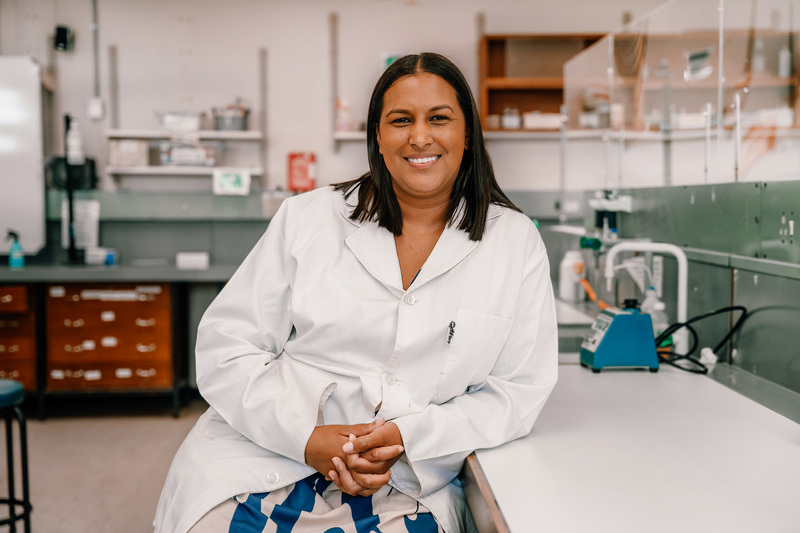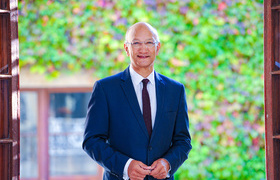Innovative waste solutions earn Marthinus VC’s Excellence Award
24 November 2025 | Story Myolisi Gophe. Photo Robyn Walker. Read time 7 min.
When scientific officer Annestacia Marthinus put up her hand to manage waste in the Department of Molecular & Cell Biology (MCB) just over a year ago, she never expected the decision to reshape the department’s entire approach to environmental safety – let alone earn her the Vice-Chancellor’s Excellence Award.
“I was overwhelmed at first,” she recalled. “But once I got started, I realised that we are all learning. You don’t have to be afraid to take on something new.”
Today, the campus community is celebrating her initiative, technical competence and leadership in transforming the MCB’s waste management system into a model of compliance, efficiency, and sustainability. Her work has already attracted interest from other departments, and her colour-coded system is being considered for wider faculty adoption.
“It was toxic to the environment, expensive, and inefficient. We needed a better way.”
Before Marthinus stepped in, the department relied heavily on two waste disposal streams: ash blend and weather (ABW) and encapsulated waste – the latter of which was packed in drums and sent to landfill. But when landfill sites stopped accepting encapsulated waste and service providers’ costs increased, it was clear that the system could no longer continue.
“It was toxic to the environment, expensive, and inefficient,” she explained. “We needed a better way.”
Her breakthrough came after completing a Lab & Research Chemical Safety & Storage course with the Department of Chemistry’s Occupational Health, Safety, and Environmental Unit, run by Monique Muller. The course introduced her to international best practice and innovative alternatives to landfill disposal. With support from her line manager, Tatiana Millard, and the department leadership, she got to work.
She conducted a full audit of the waste generated across teaching labs, research labs and facilities. Working closely with principal investigators, she mapped how chemicals were used, stored and discarded. Muller and Sophie Rees-Jones’s guidance was invaluable during this time.
The result was a complete redesign of the waste system:
- three primary waste streams – halogenated, non-halogenated, and inorganic
- working towards establishing dedicated, specialised waste streams, using knowledge and experience to guide the process; recycling of glass waste bottles, replacing the old 2.5-litre disposal system
- colour-coded waste bottles with clear labels, designed by Marthinus herself
- standard operating procedures (SOPs) and departmental training sessions.
“It was important to make the system easy to use,” she said. “People are always resistant to change, so I wanted a solution that students and staff could adopt quickly.”
Her colour-coded bottles – now a familiar sight in MCB labs – do exactly that, providing instant clarity on what should be decanted where, reducing risk and improving compliance.
More safety, less waste
The changes have already delivered measurable benefits.
Halogenated and non-halogenated waste can be recycled rather than landfilled, dramatically reducing the department’s environmental footprint. The shift to recycling glass bottles, paired with triple-rinsing procedures, has made the entire system more sustainable.
Equally important, the new system has raised safety standards. Incompatible chemicals can cause dangerous reactions, but Marthinus’ design eliminates uncertainty.
“The labels tell you exactly what can go into the bottle,” she explained. “It removes the stress for lab managers and ensures students are compliant.”
“This is the first time I really feel affirmed by my institution. It felt really good.”
Her work has also helped tackle long-standing issues with expired chemicals. Some laboratories were unknowingly storing chemicals long past their shelf life – a costly and hazardous problem.
“We’re now working towards pulling inventories from different labs and helping teams share consumables,” she said. “It saves money, reduces waste, and improves safety.”
Despite the scale of her impact, Marthinus insists she never expected acknowledgement.
“I’m a hard worker, and you don’t do the work to be seen,” she noted. “But this is the first time I really feel affirmed by my institution. It felt really good.”
The recognition came at the end of what she calls “the biggest week” of her nine-year UCT career. On the same day she received news of the VC’s Excellence Award, she also won Occupational Health and Safety’s ‘Award of the Year – Safety Innovation Champion’, while in the same week, celebrating her ninth wedding anniversary and her son’s eighth birthday.
“It was overwhelming – in the best way,” she said. “You just think, ‘Wow, people really see what I’m doing.’”
Building a culture of initiative
As a mother, Marthinus said the instincts she uses at home – problem-solving, anticipating issues, working proactively – have shaped her approach to work.
“As a mother, you don’t wait for problems to explode – you anticipate them,” she reflected. “Those skills helped me as a staff member. If something looks like it will become an issue, you go straight in and sort it out.”
Her message to the UCT community is clear: “Don’t be afraid of doing new things. See challenges as something to overcome.”
Apart from overseeing the waste system within MCB, Marthinus and colleagues have been working closely with labs to take proper stock of the chemicals they hold. The aim is to minimise expired and unused chemicals and to create a culture of accountability and awareness.
“When a lab no longer needs a chemical, we first try to rehome it – almost like a chemical ‘claim system’ – so that another lab can make use of it rather than letting it go to waste. This has already helped us significantly reduce the amount of hazardous waste the department needs to dispose of,” she said.
“If we can collectively maintain this mindset, we not only save costs and reduce environmental impact, but we also build a more sustainable and responsible research culture for the long term.”
This, according to Marthinus, aligns with the core principles of the waste hierarchy: reduce, reuse, and only then dispose. “Our goal is to embed these principles into how we operate as a department, making thoughtful decisions about what we purchase, what we keep, and what we pass on. If we can collectively maintain this mindset, we not only save costs and reduce environmental impact, but we also build a more sustainable and responsible research culture for the long term.”
She credits the MCB team for standing behind her innovations. “It wasn’t just me – as a department, we came together. The support, the ideas, the advice … all of it helped build a better system and will continue to help us improve.”
With sustainability and safety now firmly embedded in MCB’s operations, Marthinus is considering the next phase: expanding the system and helping other departments improve their waste management processes.
“There’s still so much we’re working on,” she said. “But to be acknowledged for what I’ve started – that means everything.”
 This work is licensed under a Creative Commons Attribution-NoDerivatives 4.0 International License.
This work is licensed under a Creative Commons Attribution-NoDerivatives 4.0 International License.
Please view the republishing articles page for more information.










